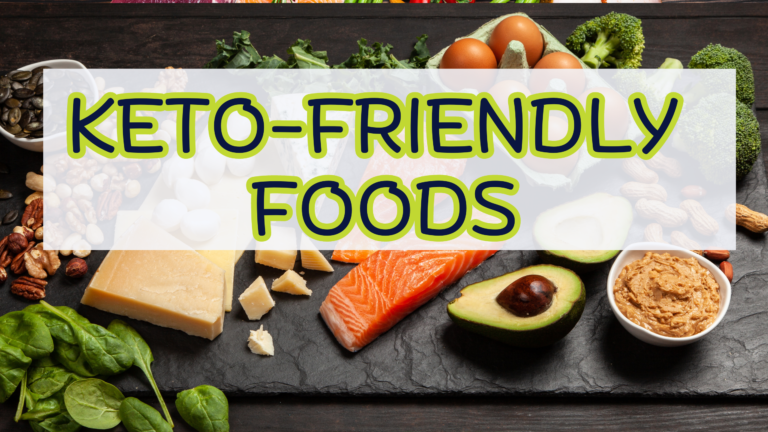Your First Weeks On Keto: What To Expect
Embarking on a new diet can be both exciting and overwhelming, especially when it comes to the popular Ketogenic diet. So, you’ve decided to give it a try, but what can you expect during those crucial first weeks? In this article, we’ll take a closer look at the initial stages of the Keto journey, providing you with valuable insights and tips to ensure a smooth transition into this low-carb, high-fat lifestyle. From subtle shifts in your body to potential challenges and triumphs, get ready to navigate the waters of your first weeks on Keto with confidence and ease.
Physical Effects
Flu-like Symptoms
When you first transition to a ketogenic diet, you may experience flu-like symptoms. This phenomenon, often referred to as the “keto flu,” is a result of your body adjusting to using fat as its primary fuel source instead of carbohydrates. Symptoms can include fatigue, headache, irritability, nausea, and dizziness. The good news is that these symptoms are usually temporary and can be managed through proper hydration, electrolyte supplementation, and getting enough rest.
Thirst and Frequent Urination
One notable change you may notice when starting keto is an increased thirst and more frequent trips to the bathroom. This is because your body is shedding water weight as it depletes its glycogen stores. As a result, it’s important to stay hydrated by drinking plenty of water throughout the day. Aim to drink at least half your body weight in ounces of water daily to maintain optimal hydration.
Weight Loss
One of the primary reasons individuals turn to the ketogenic diet is for weight loss. By cutting out carbs and reducing insulin levels, your body enters a state of ketosis, where it burns fat for energy instead of glucose. As a result, many people experience rapid weight loss in the initial weeks of starting the diet. However, it’s important to note that weight loss may vary from person to person, and factors such as individual metabolic rate and overall calorie intake also play a role.
Increased Energy
Another positive change you may experience on a ketogenic diet is increased energy levels. As your body adjusts to using fat as its primary fuel source, you may find yourself feeling more energetic throughout the day. Many people report improved mental clarity and focus as well. This sustained energy can be particularly beneficial for athletes and those engaged in regular exercise.
Constipation and Digestive Changes
While the increase in fat consumption on a ketogenic diet can be beneficial for many aspects of your health, it may also affect your digestive system. Some individuals may experience constipation or changes in bowel movements due to the decreased fiber intake and changes in gut bacteria. To combat this, make sure to include fiber-rich foods, such as non-starchy vegetables and flaxseeds, in your diet. Additionally, staying hydrated can help alleviate digestive issues.
Change in Body Odor
It’s not uncommon to notice a change in body odor when starting a ketogenic diet. This change is primarily due to the release of ketones through your breath and sweat. As your body enters ketosis, it breaks down fats for fuel and produces ketones, which can have a distinct smell. While this change in body odor is temporary and varies from person to person, practicing good hygiene can help minimize any potential odor.
Possible Hair Loss
Hair loss can be a concerning side effect for some individuals when they first start a ketogenic diet. However, it’s important to note that this is usually a temporary phase as your body adjusts to the dietary changes. The hair loss is often a result of a temporary disruption in the hair growth cycle, and normal hair growth should resume once your body adapts to the new diet. If you’re concerned about hair loss, speak with a healthcare professional for reassurance and guidance.
Improved Skin Health
The ketogenic diet has been shown to have positive effects on skin health. By eliminating refined sugars and processed foods, which are known to contribute to skin problems like acne and inflammation, many people notice clearer and healthier skin. The reduction in inflammation associated with ketosis can also help alleviate other skin conditions, such as eczema and psoriasis. Improved skin health is just one of the many benefits that can result from following a well-balanced ketogenic diet.
Better Sleep
Many individuals report improved sleep quality when they transition to a ketogenic diet. This can be attributed to several factors, including stable blood sugar levels and increased production of the sleep-regulating hormone, serotonin. Additionally, the reduced inflammation and improved energy levels associated with ketosis can contribute to a more restful sleep. Adequate sleep is crucial for overall health and well-being, so the positive impact of keto on sleep is a welcome side effect for many.
Reduction in Inflammation
Inflammation is a key driver of many chronic diseases, such as heart disease and diabetes. The ketogenic diet has been shown to have anti-inflammatory effects, reducing systemic inflammation throughout the body. By eliminating processed foods and sugars, which are known to promote inflammation, and increasing your intake of healthy fats, you can help support a healthy inflammatory response. This reduction in inflammation can have wide-ranging benefits, including improved joint health, cognitive function, and overall well-being.
Emotional and Mental Changes
Sugar Cravings and Carb Withdrawal
One of the significant challenges when starting a ketogenic diet is managing sugar cravings and carb withdrawal symptoms. The removal of sugar and refined carbohydrates from your diet can lead to cravings and mood swings as your body adjusts to the absence of these substances. However, the good news is that over time, as your body adapts to using fat as its primary fuel source, these cravings often subside. In the initial weeks, it can be helpful to have keto-friendly snacks on hand like nuts, seeds, and low-carb vegetables to help you through this adjustment period.
Increased Mental Clarity
Many individuals report increased mental clarity and improved cognitive function when following a ketogenic diet. This can be attributed to the stable blood sugar levels achieved through ketosis. Unlike the fluctuations in energy and focus that can occur with high-carbohydrate diets, the steady release of ketones as an energy source provides a constant supply of fuel to the brain. This can enhance concentration, memory, and overall mental performance.
Improved Mood and Reduced Anxiety
The ketogenic diet has been associated with improved mood and reduced anxiety for many individuals. The stabilizing effect on blood sugar levels, as well as the elimination of processed foods and sugars, helps balance mood swings and promote greater emotional stability. Additionally, the increased consumption of healthy fats and the production of ketones can have a positive impact on brain chemistry, further supporting emotional well-being.
Changes in Hunger and Appetite
One of the benefits of a ketogenic diet is its ability to regulate hunger and appetite. When you cut out carbohydrates and rely on fats and protein for fuel, you may notice a decrease in cravings and a feeling of fullness for longer periods. This can make it easier to stick to a calorie deficit if weight loss is your goal. However, it’s important to listen to your body’s hunger cues and fuel it with the appropriate amount of nutrients to maintain overall health and satiety.
Better Focus and Concentration
In addition to increased mental clarity, many individuals experience improved focus and concentration when following a ketogenic diet. The steady supply of energy provided by ketones supports sustained mental performance, enabling you to stay focused and productive throughout the day. This can be particularly beneficial for tasks that require cognitive effort, such as work or studying.
Transition and Adaptation
Keto Flu and How to Manage It
The keto flu is a common phenomenon experienced by individuals transitioning to a ketogenic diet. It’s important to understand that this is a temporary phase as your body adjusts to using fat as its primary fuel source. To manage the keto flu symptoms, it’s crucial to stay hydrated by drinking plenty of water and replenishing electrolytes. Adding a moderate amount of sodium, magnesium, and potassium to your diet or taking supplements can help alleviate symptoms such as fatigue, headache, and muscle cramps.
Adapting to Fat as a Fuel Source
Adapting to fat as your body’s primary fuel source can take some time. During the transition period, you may experience fluctuations in energy levels and performance. It’s important to be patient with yourself and allow your body the time it needs to adapt. Gradually increasing your fat intake and reducing carbohydrates over time can help ease the transition and minimize any negative symptoms.
Electrolyte Imbalances and How to Prevent Them
When following a ketogenic diet, it’s essential to be mindful of your electrolyte balance. The reduction in carbohydrates and increased water intake can lead to electrolyte imbalances, particularly sodium, magnesium, and potassium. To prevent imbalances, include foods rich in these electrolytes in your diet and consider supplementation if needed. Avocados, leafy greens, nuts, and seeds are excellent sources of magnesium and potassium, while broth and adding sea salt to your meals can help increase sodium levels.
Maintaining Sufficient Hydration
Proper hydration is essential on a ketogenic diet, particularly in the initial weeks when you may be shedding water weight. Aim to drink at least half your body weight in ounces of water each day to ensure adequate hydration. If you’re engaging in intense physical activity or live in a hot climate, you may need to increase your water intake even further. Monitoring the color of your urine can serve as a helpful indicator of your hydration levels.
Transitioning from a High-Carb Diet
If you’re transitioning from a high-carb diet to a ketogenic one, it’s essential to plan your transition carefully. Suddenly cutting out all carbohydrates from your diet can be a shock to your system. Instead, gradually reduce your carbohydrate intake over a period of a few weeks while increasing your healthy fat consumption. This gradual transition can help minimize the symptoms of keto flu and make the adaptation process more manageable.
Social Implications
Navigating Social Events and Eating Out
Adhering to a ketogenic diet can present challenges when it comes to social events and eating out. Many traditional social gatherings and restaurant menus revolve around carbohydrate-rich foods. However, with a little planning and creativity, you can still enjoy social occasions while staying true to your dietary goals. Researching the menu in advance, opting for protein and vegetable-based dishes, and bringing your own low-carb options to share can help you navigate social events successfully.
Explaining Your Dietary Choices to Others
When embarking on a ketogenic diet, you may encounter curiosity or skepticism from friends, family, and colleagues. It’s helpful to arm yourself with knowledge about the benefits of the ketogenic diet and be prepared to explain your dietary choices to others. Emphasize that the ketogenic diet is a scientifically backed approach to improving health and well-being. Sharing your personal experiences and positive results can also help others understand your commitment to this way of eating.
Dealing with Peer Pressure and Food Temptations
Peer pressure and food temptations are common challenges when following any specific dietary approach. People around you may not understand or respect your commitment to a ketogenic diet, and they may try to convince you to indulge in high-carb foods. It’s important to stay firm in your decision and prioritize your health and well-being. Additionally, having a support system or finding like-minded individuals who also follow a ketogenic lifestyle can provide encouragement and accountability.
Finding Support and Accountability
Support and accountability are essential factors in successfully adopting and maintaining a ketogenic lifestyle. Surrounding yourself with like-minded individuals who understand and share your goals can provide invaluable support and encouragement. Consider joining online communities, attending local meet-ups, or partnering with a friend or family member who is also interested in or following a ketogenic diet. Sharing your challenges, successes, and progress with others can foster a sense of community and provide the support you need to stay on track.
Potential Challenges and Solutions
Meal Planning and Recipe Research
Meal planning and recipe research are crucial aspects of a successful ketogenic diet. The key is to focus on whole, unprocessed foods that are low in carbohydrates and high in healthy fats. Utilize online resources, cookbooks, and social media platforms dedicated to ketogenic recipes for inspiration and variety. Dedicate time each week to meal planning, grocery shopping, and food prep to ensure you have keto-friendly options readily available.
Overcoming Keto Plateaus
It’s not uncommon to experience weight loss plateaus or slowed progress on a ketogenic diet. If you find yourself in a keto plateau, where you’re no longer experiencing steady weight loss, it’s essential to reassess your approach. Consider reevaluating your macronutrient ratios, increasing physical activity, or implementing intermittent fasting to break through the plateau. Additionally, tracking your food intake and ensuring you’re in a calorie deficit may help kickstart weight loss again.
Dealing with Keto Breath
Keto breath is a common side effect of being in ketosis. It’s characterized by a fruity or acetone-like odor that can be a bit unpleasant. The good news is that this is a temporary phase as your body adapts to using fat for fuel. Drinking plenty of water, practicing good oral hygiene, and using sugar-free gum or mints can help mask the odor. It’s important to note that keto breath is a sign that you’re in ketosis, so embrace it as a positive indication of your body’s fat-burning state.
Managing Cravings and Binge-Eating
While a ketogenic diet can help reduce cravings and promote satiety, occasional cravings may still arise. It’s important to recognize the difference between physical hunger and emotional cravings. Practice mindful eating and listen to your body’s hunger cues. If cravings persist, consider incorporating more healthy fats into your meals or having keto-friendly snacks on hand. If you find yourself struggling with binge-eating or disordered eating behaviors, it’s important to seek support from a healthcare professional.
Balancing Macronutrients and Micronutrients
Ensuring you’re getting an adequate balance of macronutrients and micronutrients is essential for maintaining optimal health on a ketogenic diet. While focusing on healthy fats and limiting carbohydrates is crucial, it’s equally important to prioritize nutrient-dense foods. Include a variety of non-starchy vegetables, nuts, seeds, and healthy sources of protein in your diet to ensure you’re getting a wide range of vitamins, minerals, and antioxidants.
Tracking Progress and Measuring Success
Tracking your progress and measuring success beyond the scale can be motivating and help you stay on track with your goals. While the number on the scale can be a helpful metric of progress, it’s important to also consider other indicators such as body measurements, changes in clothing size, increased energy levels, improved sleep, and mental clarity. Keeping a journal, taking progress photos, or using apps to track your food intake and exercise can provide a comprehensive picture of your success on a ketogenic diet.
Physical Performance and Exercise
Initial Decrease in Energy and Performance
In the early stages of transitioning to a ketogenic diet, you may experience a temporary decrease in energy and physical performance. This is because your body is adapting to using fat as its primary fuel source instead of glucose. It’s important to be patient with yourself and understand that this decline is temporary. As your body becomes keto-adapted, you should regain your energy and notice improvements in your physical performance. In the meantime, consider adjusting the intensity and duration of your workouts to match your energy levels.
Adapting to Exercise on a Ketogenic Diet
Adapting to exercise on a ketogenic diet may require some adjustments to your training routine. Lower-intensity exercises, such as walking, cycling, or yoga, are typically well-tolerated on a ketogenic diet. However, high-intensity exercises, such as sprinting or weightlifting, may require additional carbohydrate intake to support performance. Consider incorporating targeted ketogenic diet (TKD) strategies, where you consume a small amount of carbohydrates before intense workouts, to optimize performance.
Optimizing Performance with Targeted Ketogenic Diet
If you’re an athlete or engage in regular high-intensity workouts, a targeted ketogenic diet (TKD) may be a beneficial strategy to improve performance. TKD involves consuming a small amount of easily digestible carbohydrates before intense workouts to provide a quick source of fuel. This approach allows you to maintain a state of ketosis while still supporting optimal performance during high-intensity exercise. Experimenting with different timing and types of carbohydrates can help you find what works best for your body and goals.
Supplementing for Athletic Performance
Supplements can play a supportive role in optimizing athletic performance on a ketogenic diet. Some common supplements used by individuals following a ketogenic lifestyle include electrolytes, omega-3 fatty acids, creatine, and exogenous ketones. It’s important to note that supplements alone cannot replace a well-formulated ketogenic diet and a balanced training program. Consult with a healthcare professional or registered dietitian to determine which supplements may be appropriate for your specific needs and goals.
Building and Maintaining Muscle Mass
Contrary to some misconceptions, building and maintaining muscle mass is absolutely achievable on a ketogenic diet. Adequate protein intake is crucial for muscle growth and maintenance. Focus on consuming high-quality protein sources, such as lean meats, fatty fish, eggs, and dairy products, to ensure optimal muscle protein synthesis. Additionally, resistance training and progressive overload are essential for stimulating muscle growth and should be incorporated into your exercise routine.
Potential Benefits Beyond Weight Loss
Improved Blood Sugar Control
The ketogenic diet has been shown to have significant benefits for individuals with type 2 diabetes or insulin resistance. By eliminating high-carbohydrate foods and focusing on healthy fats and protein, the ketogenic diet can help stabilize blood sugar levels and improve insulin sensitivity. This can lead to better blood sugar control and reduced reliance on medication for managing diabetes.
Reduced Risk of Chronic Diseases
Adopting a ketogenic diet may help reduce the risk of chronic diseases. By eliminating refined sugars, processed foods, and unhealthy fats, and focusing on nutrient-dense whole foods, the ketogenic diet can support overall health and well-being. Studies have shown that the ketogenic diet may have positive effects on cardiovascular health, brain function, and metabolic health, reducing the risk of conditions such as heart disease, Alzheimer’s disease, and metabolic syndrome.
Enhanced Mental Performance and Brain Health
The ketogenic diet has been studied for its potential cognitive and neurological benefits. Ketones, the byproduct of fat metabolism, are a preferred fuel source for the brain and have been shown to improve cognitive function and support brain health. The ketogenic diet has also shown promise in managing and preventing neurodegenerative conditions such as Alzheimer’s disease and epilepsy.
Stable Energy Levels Throughout the Day
The stable energy levels associated with ketosis can be a significant benefit of a ketogenic diet. Unlike the ups and downs in energy levels often experienced with high-carbohydrate diets, the consistent release of ketones as an energy source provides a steady supply of fuel throughout the day. This can lead to increased productivity, sustained focus, and reduced reliance on frequent snacking or caffeine for energy.
Decreased Risk of Inflammation and Joint Pain
Inflammation is a underlying factor in many chronic diseases and can contribute to joint pain and discomfort. The ketogenic diet has been shown to have anti-inflammatory effects, reducing systemic inflammation throughout the body. By eliminating processed foods and sugars, and increasing your intake of healthy fats, you can help support a healthy inflammatory response. This reduction in inflammation can have wide-ranging benefits, including improved joint health and reduced pain.
What to Do If It Doesn’t Work for You
Reevaluating Your Approach
If you find that the ketogenic diet is not working for you, it may be necessary to reevaluate your approach. Consider tracking your food intake and macronutrient ratios to ensure you’re truly in a state of ketosis. Additionally, assess the quality and types of foods you’re consuming. While the ketogenic diet focuses on high-quality fats and protein, it’s still essential to prioritize whole, nutrient-dense foods and limit processed options.
Adjusting Your Macronutrient Ratios
Individuals have varying macronutrient needs, and what works for one person may not work for another. If you’re not seeing the desired results on a ketogenic diet, it may be helpful to adjust your macronutrient ratios. Increasing or decreasing your fat or protein intake can sometimes lead to improved outcomes. Experimenting with different ratios and tracking your progress can help you find the optimal balance for your body and goals.
Considering Underlying Health Conditions
Underlying health conditions may influence the effectiveness of a ketogenic diet. Certain medical conditions, such as thyroid disorders or hormonal imbalances, can affect how your body responds to different dietary approaches. If you’re experiencing challenges or not seeing the desired results, it may be beneficial to consult with a healthcare professional to address any underlying health conditions that could be impacting your progress.
Consulting with a Healthcare Professional
If the ketogenic diet is not working for you or you have underlying health concerns, it’s always a good idea to consult with a healthcare professional. They can provide personalized guidance and help you navigate any challenges you may be facing. A healthcare professional, such as a registered dietitian or nutritionist, can help tailor a dietary approach to your specific needs and goals, ensuring you’re on the right path to optimal health.
Exploring Alternative Forms of Low-Carb Diets
If the strict macronutrient ratios of a ketogenic diet are not suitable for you, there are alternative forms of low-carb diets that may better align with your preferences and needs. For example, a low-carb, high-fat (LCHF) diet or a moderate-carbohydrate, healthy fat diet can still provide many of the benefits associated with ketosis while allowing for a slightly higher carbohydrate intake. It’s important to find a dietary approach that is sustainable and enjoyable for you in the long term.
Long-Term Sustainability and Lifestyle Changes
Creating Healthy Habits and Routines
The key to long-term success on a ketogenic diet is to create healthy habits and establish a sustainable routine. Incorporate a variety of nutrient-dense foods into your meals, prioritize regular physical activity, ensure adequate hydration, and practice mindful eating. Making these habits a part of your daily life will not only support your ketogenic lifestyle but also contribute to your overall health and well-being.
Building a Sustainable Meal Plan
Meal planning is a crucial component of maintaining a ketogenic lifestyle. Build a sustainable meal plan that incorporates a variety of whole foods, recipes, and flavors to keep your meals exciting and satisfying. Experiment with new ingredients and cooking techniques to expand your culinary horizons while adhering to your macronutrient goals. Planning in advance and dedicating time for weekly meal prep can help ensure you always have keto-friendly options readily available.
Cultivating a Positive Relationship with Food
A ketogenic diet offers an opportunity to reevaluate your relationship with food and cultivate a positive mindset around eating. Focus on nourishing your body with nutrient-dense whole foods rather than solely focusing on restriction. Practice mindful eating, savor your meals, and prioritize self-care. By approaching food with a positive mindset and making choices that align with your health goals, you can develop a sustainable and enjoyable approach to eating on a ketogenic diet.
Finding Balance in Social and Emotional Eating
Maintaining a balance between social and emotional eating while following a ketogenic diet can be a challenge. It’s important to find a balance that allows for flexibility and enjoyment without compromising your dietary goals. Recognize that occasional indulgences or deviations from your eating plan are part of a balanced lifestyle. Practice mindful decision-making, plan ahead for social events, and find alternative ways to cope with emotional triggers that don’t involve food.
Integrating Exercise and Physical Activity
Regular physical activity is essential for overall health and well-being, regardless of the diet you follow. Incorporate exercise and physical activity into your daily routine to optimize the benefits of a ketogenic diet. Aim for a combination of cardiovascular exercise, strength training, and flexibility work to support your overall fitness and health goals. Find activities that you enjoy and make them a regular part of your lifestyle.
Celebrating Milestones and Success
Setting Realistic Goals and Expectations
Setting realistic goals and managing expectations is crucial for long-term success on a ketogenic diet. Understand that weight loss and health improvements are not linear processes and may take time. Rather than focusing solely on the number on the scale, also celebrate non-scale victories such as increased energy, improved sleep, and enhanced mental clarity. By setting realistic goals and acknowledging all types of progress, you can stay motivated and continue to make positive changes.
Measuring Progress Beyond the Scale
While the scale can be a valuable tool for tracking progress, it’s important to measure success beyond just weight loss. Consider other indicators such as body measurements, changes in clothing size, increased strength or endurance, improved blood sugar control, or enhanced mental performance. Keep a journal or utilize apps to track these non-scale victories and celebrate them as markers of your success on a ketogenic diet.
Rewarding Yourself for Achievements
Reaching milestones and achieving goals on a ketogenic diet deserves recognition and celebration. Set up a system of rewards for yourself to stay motivated and reinforce positive behaviors. Choose rewards that align with your health goals, such as treating yourself to a new fitness accessory, a massage, or a day of rest and relaxation. Celebrating your achievements encourages sustainable habits and creates positive associations with your ketogenic lifestyle.
Maintaining Motivation and Focus
Maintaining motivation and focus on a ketogenic diet requires ongoing commitment and dedication. Find sources of inspiration that resonate with you and remind you of why you started this journey. This could be reading success stories, following social media accounts that share keto-friendly recipes and tips, or joining online communities of individuals who are also following a ketogenic lifestyle. Surrounding yourself with positivity and support can help you stay motivated and focused on your goals.








